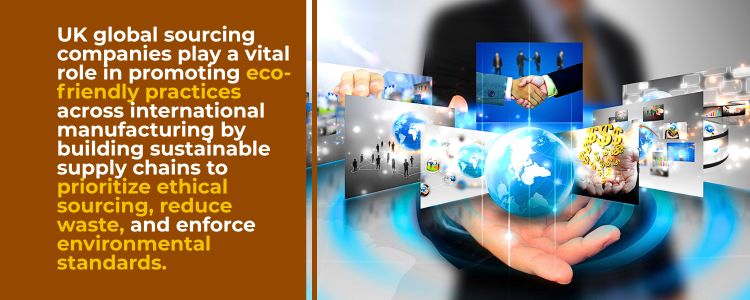The Role of UK Global Sourcing Companies in Sustainable Manufacturing
During a time when environmental and ethical issues are affecting business decision making, the importance of UK Global Sourcing Companies and their role to leverage their influence over sustainable manufacturing has not been more important. These Companies serve as the intermediary between manufacturers and global suppliers – they are now expected to do more than provide a cost and lead time, These Companies need to responsibly source products and ensure the responsible sourcing relationships meet the increasing pressure for corporate sustainability.
UK Global Sourcing Companies: Navigating the Shift to Responsible Manufacturing
In the past, the procurement strategies used rewarded Sourcing Companies for optimising their size to create a price advantage, and managing a pricing strategy designed to maximise profits. This model has changed considerably, as the manufacturer and retailer are held accountable not only for producing what product, but for how they are producing that product. Sourcing agencies have now become policy enablers of ethical production practices, and are a direct link to achieve environmental and social objectives over the long term.
Sourcing companies now work with manufacturers, vet suppliers, audit working conditions, and reduce environmental footprints during the production of the product. Many sourcing organisations partner with certification bodies and environmental audit firms, and implement third party verification systems to enable their clients to make evidenced based responsible purchasing decisions.

Product Sourcing Companies: Gatekeepers of Traceable Supply Chains
As the scrutiny of origins and labor practices increase, product sourcing firms are becoming the very gatekeepers to ethical labor and material sourcing practices. Companies are mapping supply chains, from raw material acquisition to delivery of finished product, increasing visibility in the tracking process. In many ways, these companies are becoming the architects of sustainable manufacturing ecosystems.
Their work has expanded from basic management of supplier relationships to supplier development. By pushing their suppliers to implement environmentally-sustainable processes and legal labor policies, sourcing companies are developing a generation of ethical manufacturers. This new definition of responsibility has transformed the role of product sourcing companies from logistics-based intermediaries to strategic partners in sustainability.
Additionally, through analytics and sourcing intel, product sourcing firms can help brands navigate between cost competitiveness and sustainability benchmarks. In the new business model, green credentials are as important as the pricing margin.
Sustainable Procurement UK: Building the Framework for Green Partnerships
The term Sustainable Procurement UK is no longer restricted to policy documents or CSR reports. It now provides a practical roadmap for sourcing partners and manufacturers. Sourcing, previously decided on the basis of availability and price, now incorporates environmental stewardship, social equity, and risk management.
UK organisations pursuing Sustainable Procurement UK initiatives, embed sustainability criteria (e.g., emissions, water, labour) into supplier contracts, promote transparency on these issues. But more importantly, they align their procurement processes with international frameworks such as the UN Sustainable Development Goals, and ISO 20400 standards.
Of course, these practices are more than compliance; they are the foundations for the competitive advantage companies will need if they wish to continue developing resilient supply chains and to remain relevant to markets. In a world where reputation equals currency, companies that embed sustainable procurement frameworks will retain higher consumer trust and investor confidence.
Sourcing from India: The New Frontier for Ethical Global Trade
For many years, Indian supply has been an appealing option for UK companies due to its considerable manufacturing capacity and lower-than-UK labour costs. But the relationship is becoming more complex. Where it was once simply a ‘transactional’ relationship primarily driven by cost savings, this is now reframed into a relationship of accountable, responsible trade partnerships.
The landscape for sourcing from India aligned with sustainability is moving in a positive direction. There are more ethical factories, women-owned businesses, and eco-certified clusters than ever before. As UK-based businesses source products from India, they are integrating into this premise of accountability on social and environmental metrics with suppliers.
India not only offers scale and diversity in sourcing, but also presents unique possibilities for enabling Global Supply Chain Sustainability. From organic textiles in Tamil Nadu to solar-powered foundries in Gujarat, the ethical manufacture story—and UK companies are helping to broaden that narrative—is steadily progressing across the subcontinent.
The Strategic Role of UK-Based Sustainable Sourcing Companies
A lot of the hard work to help organizations become green in their operations is done by parent UK-Based Sustainable Sourcing Companies. These companies have developed supplier scorecards, built ethical auditing frameworks and technology that maps carbon emissions throughout value chains. They are not only operational but transformational. By adopting Green Sourcing Strategies, they can reduce environmental harm while supporting suppliers in developing nations to update their operations. They are incentivising production technologies that are cleaner to biodegradable packaging; these green sourcing companies are measuring impacts.
An emerging area of interest is aligning sourcing policies with UK Import-Export and Sustainability regulations. With post- Brexit trade policies settling, there is increased attention to compliance, especially around environmental reporting and carbon disclosures. Perhaps most importantly, UK companies find themselves both accountable and empowered to lead change through improved sourcing decisions.
Conclusion
The movement towards sustainable manufacturing is not solely their responsibility. It is a collective responsibility in which these Companies, product sourcing companies and their global partners are equally key contributors. They are pushing the envelope of future procurement models, working towards a commitment to ethical suppliers and promoting sustainable sourcing models.
Through this process, they are not merely responding to the market, they are transforming it. As calls for transparency and sustainability escalate and demand increases, their ability to affect systemic change is likely to be the measure of how quickly the global sourcing narrative shifts from a short-term perspective to a longer term genuine responsibility.









